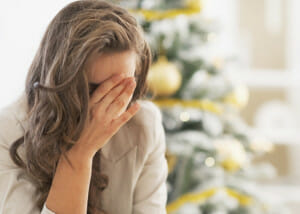The holidays are over. Routines are returning to normal, so why do you feel depressed?
After all, you’ve survived holiday stress, and maybe even traveled without experiencing a major episode.
Even though, these are things you think you would be celebrating there is still a persistent feeling of sadness. This is commonly referred to as the “post-holiday blues”. While anyone can experience this, it can be devastating if you have bipolar disorder.
Why You Get Depressed After the Holidays
There are several reasons why bipolar depression can be particularly severe in January. Knowing why can help you limit the severity of the episode or even prevent it.1
Loneliness
One of the main causes of post-holiday depression is loneliness. While it can be stressful being around family and friends, suddenly finding yourself alone is often just as upsetting. Just like the constant noise and commotion can send you looking for a quiet place to hide, the silence can leave you feeling lonely.
These feelings can be intensified if a loved one has recently past. You might not notice the absence when everyone is around, but their loss is often deeply felt once you’re alone.
Over spending
This is a frequent problem during the holidays. It’s easy to get caught up in the excitement. Before you realize it, you’ve exceeded your holiday budget. Whether it was due to a manic episode or just getting into the spirit of giving, you’ve over spent.
Once you’ve come down from the “holiday high”, totaling up the receipts can be depressing. You might feel like a failure due to your inability to budget, especially if you bought a present for yourself.
Seasonal depression
Seasonal affective disorder (SAD) is different from the deep lows associated with bipolar disorder. However, this doesn’t mean that seasonal changes won’t also affect you.
January is a depressing month. Leaves have fallen off the trees, the sun rarely shines, and the chilly weather can make it difficult to enjoy spending time outdoors. All this combined is often enough to trigger a depressive episode.
Holiday Stress
The stress of making it through the occasion without having a bipolar episode, can be enough to trigger one.
When you add the pressures of crowds, shopping and having a limited amount of time to get everything done, it’s easy to feel overwhelmed. You might also be dealing with family conflicts, along with pressure to create the “perfect” holiday environment. By the time it is over, you might be ready for some time alone.
Unfortunately, this is often when a depressive episode starts. Some people might feel relived that the stress is over, but this isn’t always true if you’re bipolar.
It is important to note that while bipolar depression is more common after the holidays, episodes of mania can also be experienced.

Signs of Post-Holiday Blues
Post-holiday blues and bipolar depression share many of the same signs. This can be confusing, especially if you are still being diagnosed for the type of Bipolar Disorder 1.
See our article on Bipolar Depression Symptoms
The main signs that could indicate you might be dealing with after holiday depression include,
- Extreme fatigue
- Trouble concentrating
- Loss of interest in activities
You might also be irritable or extremely emotional. The smallest thing could ignite your temper, or leave you in tears.
These symptoms, and others are often the same as what you experience during bipolar depression. The only difference is that they are brought on by the end of the holiday season, and for some this can make it worse.

How to Prevent After Holiday Depression
You can take steps to limit and even prevent depression after the holidays. Some of these tips can be used throughout the year to help you manage and control other episodes.2
- Sleep is crucial.
Your sleeping schedule has probably been off, and now’s the time to fix this. Have a set bed-time, and follow it. When you’re well rested your mood often improves, and you have plenty of energy to make it through the day.
- Limit alcohol intake.
Alcohol is a depressant, and can intensify a bipolar episode. If you do decide to drink, limit it to one or two at the most. Before you do indulge, make sure that it won’t interfere with your prescribed medication.
DO Not stop taking your meds, just to enjoy a few drinks with family or friends.
- Don’t be afraid to say “no”.
If you simply can’t handle another “get together”, even with a few close friends, say “No”. Taking time for yourself is important, and you shouldn’t feel guilty for doing so.
Be careful that you don’t isolate yourself, it is still important to have loved ones around.
- Exercise regularly.
Even if it’s just for a few minutes a day, exercise is a great tool at controlling some bipolar depression. It releases endorphins that help boost your mood. Exercising also improves overall health, and this can prevent severe post-holiday depression.
- Set goals.
Whether the goal is to read a book, lose weight or organize a closet. Simply having one can prevent depression. Instead of feeling blue, you have something to put your energy into. This can also help you during a manic episode.
- Plan an event.
If you’re feeling low due to loneliness, start planning a time where you can get together again. If you prefer not to travel, see what attractions will be comfortable for you in the area.
You can even plan something for you to do alone. All that matters, is that you look forward to it.

Holiday Depression with Bipolar Disorder
It’s okay if you’re feeling depressed. It can happen to anyone after a special occasion.
If you have bipolar disorder, it can be especially difficult to “shake the post-holiday blues”.
Along with recognizing your triggers, it is important to have the right tools to prevent depression or mania. Use the tips provided, and take advantage of your support network. Don’t be afraid or ashamed to ask for help if needed. You don’t have to go through this alone.
Please remember, if you ever have any suicidal feelings or urges speak to a mental health care professional immediately.
References:
1https://centerfordiscovery.com/blog/seasonal-affective-disorder-holiday-anxiety-holiday-blues/
2https://www.nami.org/blogs/nami-blog/november-2015/tips-for-managing-the-holiday-blues
 Medically reviewed by
Medically reviewed by